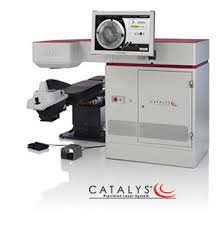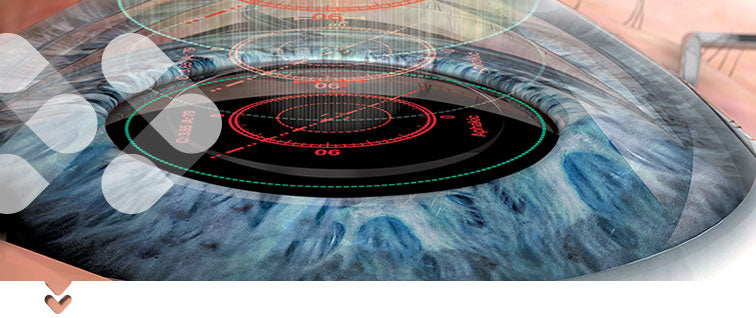What are the advantages to Femtosecond Laser-Assisted Cataract Surgery?
There are 4 basic steps to cataract surgery: 1) the envelope holding the lens of the eye is surgically opened, 2) the lens is fractured into pieces, 3) the pieces are vacuumed out of the eye, and finally, 4) a synthetic lens implant is inserted in place of your natural lens. In Laser-Assisted Cataract Surgery, the first two steps are performed by laser and third step by ultrasound, whereas in Ultrasonic Surgery, the first three steps are performed by ultrasound.
A computer-guided laser is more precise than even the best human hands.
Which method of cataract surgery is better?
Patients do well with both procedures. The femtosecond laser applies less energy to break apart the cataract. It is therefore not only more precise, it is also gentler in performing the first two steps of cataract surgery. It has been our experience that patients undergoing Laser-Assisted Cataract Surgery have clearer vision on the first post-operative day. For most patients, the differences are slight comparing both procedures. Additionally, VisiVite's C.E.O. Dr. Krawitz recommends that you consider Laser-Assisted Cataract Surgery if you have one of the following conditions: extremely dense cataract, previous significant eye trauma or unstable cataract support, pseudoexfoliation syndrome, or poor corneal endothelial cell health. Even if you do not have one of these conditions, you can have Laser-Assisted Cataract Surgery.
Does Medicare pay for both procedures?
Medicare and supplementary insurance pay 100% toward ultrasonic cataract surgery. There is an out-of-pocket additional fee for Laser-Assisted Cataract Surgery.
I’m very nervous. Will that affect my outcome?
A board-certified anesthesiologist administers intravenous sedation to make you calm and relaxed. Most patients are surprised to learn that it is over so quickly.
Does cataract surgery hurt?
There is some pressure, but not pain with the first two steps of Laser-Assisted Cataract Surgery, while there is no discomfort with Ultrasonic Cataract Surgery.
I don’t want to see anything.
It is optically impossible to watch the surgery being performed on your own eye.
How long does the surgery take?
Laser-Assisted Cataract Surgery is performed in two different rooms and takes about 15 minutes. Ultrasonic Cataract Surgery takes about 5 minutes.
Are these surgeries done in the office?
Cataract surgery is not done in the office. It can be performed in an ambulatory surgery center (ASC) or hospital, although many ophthalmic surgeons prefer to perform them in ambulatory surgery centers because of their low infection rates, staff expertise, and time efficiency.
How long do I have to wear a patch?
Some ophthalmologists require their patients to wear a patch after surgery, while others do not..
How long will I need to be home recovering?
Most patients resume full activities the day after surgery, including bending and lifting.
How long will someone need to be with me while I’m recovering?
You will not need any assistance. Ophthalmic technicians who work with doctors will often show you how to put in your own eyedrops, if you need help doing that.
I have a heart murmur.
Cataract surgery does not require any oral antibiotics.
How long do I have to stop my Coumadin, Plavix or aspirin?
Cataract surgery by surgeons who use topical anesthesia is bloodless and does not require discontinuing any of those medications. If you have surgery by a doctor who requires that you have a numbing injection with a needle, you will likely have to discontinue those medications for a period of time prior to surgery.
Isn’t it better to wait until the cataract is ripe?
With older-style cataract surgeries in the 1970’s that often required 60-90 minutes to perform, doctors recommended waiting until the cataract was “ripe” or vision was very poor before operating. With modern techniques that take a small fraction of that time, doctors now recommend surgery as soon as your visual symptoms – especially night driving and reading - begin causing difficulties, because both the surgery and recovery are simpler and faster, and the surgery is safer.
Which lens implant is best for me?
A basic monofocal lens implant will provide good distance vision only if you have a low amount of astigmatism. If you have astigmatism of 1.0 or more, a toric lens implant will give you the clearest vision for distance. If you have less than 1.0 units of astigmatism, a multifocal lens implant will give you the ability to see both far and near, even without glasses. Insurance companies pay fully for a basic monofocal implant. While toric and multifocal lenses have additional cost, they also have very high satisfaction rates.














